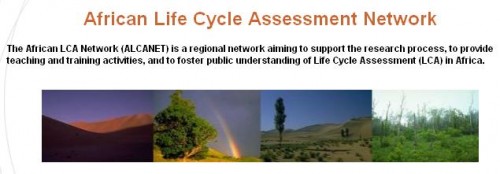Africa’s life cycle assessment (LCA) initiatives, past and present

ALCANET may no longer be active, but other global organizations are going strong {estis.net/sites/alcanet}
Not surprisingly, the concept of life cycle assessment (LCA) is not widespread in Africa (a bevy of information exists on the related subject of sustainable consumption and production, but more on that later). After all, the evaluation of environmental impacts of digital products and services is a daunting task. It requires adequate skilled manpower and additional economic resources (of which are difficult to track). A recent article in Tanzania’s The Citizen highlighted the need for “a comprehensive lifecycle assessment [LCA] of digital product and services such as downloadable music, e-books and online news.” Today, the terms LCA and Africa rarely seem to exist in the same sentence. And, if they do, the co-existence is probably at the institutional level. During 2005-2006, the term was used frequently by a variety of organizations, programs, and workshops. One such organization was ALCANET.
In 2004, an LCA Knowledge Network in Africa officially began with the goal to support research, provide training, and disseminate LCA information to the public. At the time, The International Journal of Life Cycle Assessment cited three reasons for the lack of LCA awareness in Africa:
- Under-explored potential to inform and evaluation development alternatives
- Low level of awareness by government and industry
- Universities are ill-equipped to handle training requirements
In a matter of months, ALCANET, in conjunction with other organizations, held a four-day training workshop and day-long symposium. Since then, however, ALCANET seems to have become a relic of the Internet past:
- The ALCANET website has not been updated in over 4 years
- The only news on the site is a 2005 summary of the four-day workshop in Nairobi
Fortunately, a variety of organization appear to have picked up where ALCANET left off, even if they do not specifically target LCA:
- The African Roundtable on Sustainable Consumption and Production (ARSCP), a non-profit NGO, recently held its sixth roundtable (on building a green economy in Africa)
- The United Nations Environment Programme Division of Technology, Industry, and Economics Sustainable Consumption and Production Branch (UNEP DTIE SCP) works with a variety of sectors and regions. UNEP is also a sponsor of the African 10-YFP on Sustainable Consumption and Production.
- The Global Footprint Network’s Africa Project explores how ecological limits relate to human development. Their annual factbook includes data on 24 countries across the continent.












 Twitter
Twitter Facebook
Facebook Pinterest
Pinterest